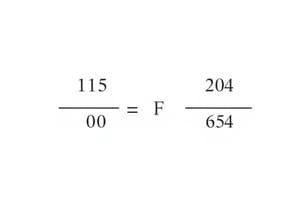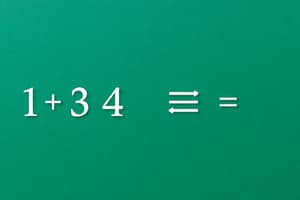Podcast
Questions and Answers
What does the commutative property state in mathematics?
What does the commutative property state in mathematics?
The commutative property states that when adding or multiplying two terms, if their positions are interchanged, there is no change in the result.
What are the three fundamental numerical and algebraic mathematics laws?
What are the three fundamental numerical and algebraic mathematics laws?
The three fundamental numerical and algebraic mathematics laws are the commutative property, associative property, identity property, and distributive property.
Give an example of the commutative property in action for addition.
Give an example of the commutative property in action for addition.
An example of the commutative property for addition is 10 + 20 = 30, and when the positions of the numbers are interchanged, 20 + 10 still equals 30.
Give an example of the commutative property in action for multiplication.
Give an example of the commutative property in action for multiplication.
Which operations does the commutative property solely deal with?
Which operations does the commutative property solely deal with?
Which property deals with changing the order of integers or variables in an expression?
Which property deals with changing the order of integers or variables in an expression?
Which property states that there is no change in the result when the positions of terms are interchanged in addition or multiplication?
Which property states that there is no change in the result when the positions of terms are interchanged in addition or multiplication?
Does the commutative property apply to subtraction?
Does the commutative property apply to subtraction?
What does the commutative property solely deal with?
What does the commutative property solely deal with?
Which of the following properties deals with changing the grouping of terms in an expression?
Which of the following properties deals with changing the grouping of terms in an expression?
Flashcards are hidden until you start studying
Study Notes
Commutative Property in Mathematics
- The commutative property states that the order of numbers or variables does not change the result in addition and multiplication operations.
Fundamental Laws of Mathematics
- The three fundamental numerical and algebraic mathematics laws are the Commutative Property, Associative Property, and Distributive Property.
Examples of Commutative Property
- Example of commutative property in action for addition: 2 + 3 = 3 + 2 = 5
- Example of commutative property in action for multiplication: 4 × 5 = 5 × 4 = 20
Scope of Commutative Property
- The commutative property solely deals with addition and multiplication operations.
Properties of Operations
- The commutative property deals with changing the order of integers or variables in an expression.
- The commutative property states that there is no change in the result when the positions of terms are interchanged in addition or multiplication.
Limitations of Commutative Property
- The commutative property does not apply to subtraction.
Distinction from Other Properties
- The commutative property solely deals with changing the order of terms in an expression, whereas the associative property deals with changing the grouping of terms in an expression.
Studying That Suits You
Use AI to generate personalized quizzes and flashcards to suit your learning preferences.




